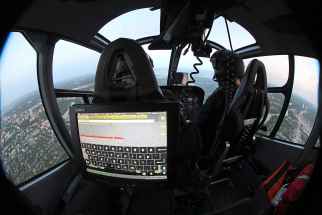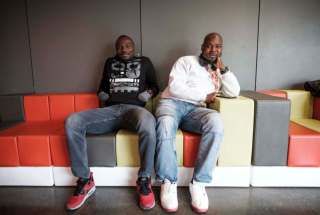Journey to Winnipeg Theatre companies offer double-bill of immigration-themed plays
Read this article for free:
or
Already have an account? Log in here »
To continue reading, please subscribe:
Monthly Digital Subscription
$0 for the first 4 weeks*
- Enjoy unlimited reading on winnipegfreepress.com
- Read the E-Edition, our digital replica newspaper
- Access News Break, our award-winning app
- Play interactive puzzles
*No charge for 4 weeks then price increases to the regular rate of $19.00 plus GST every four weeks. Offer available to new and qualified returning subscribers only. Cancel any time.
Monthly Digital Subscription
$4.75/week*
- Enjoy unlimited reading on winnipegfreepress.com
- Read the E-Edition, our digital replica newspaper
- Access News Break, our award-winning app
- Play interactive puzzles
*Billed as $19 plus GST every four weeks. Cancel any time.
To continue reading, please subscribe:
Add Free Press access to your Brandon Sun subscription for only an additional
$1 for the first 4 weeks*
*Your next subscription payment will increase by $1.00 and you will be charged $16.99 plus GST for four weeks. After four weeks, your payment will increase to $23.99 plus GST every four weeks.
Read unlimited articles for free today:
or
Already have an account? Log in here »
Hey there, time traveller!
This article was published 23/05/2018 (2759 days ago), so information in it may no longer be current.
Movies commonly used to run as double-bills. Theatre productions… not so much.
But two local theatre companies are taking that approach on the very pertinent theme of immigration, joining forces in two shows playing at the Asper Centre on the University of Winnipeg Campus.
Theatre preview
New Beginnings
Sarasvàti Productions
May 22 to May 27
Asper Centre for Theatre and Film
Tickets $15 – $20 at sarasvati.ca or 204-586-2236.
New Beginnings, from Sarasvàti Productions, is the culmination of a two-year process employing 20 performers to explore the theme of displacement and resettlement, encompassing established immigrants, newcomers and resident artists.
Boundary Avenue, from One Trunk Theatre, zeros in on the very specific stories of two Ghanaian refugees, Razak Iyal and Seidu Mohammed, who lost fingers to frostbite in their crossing into Canada from the U.S. border at Emerson on Christmas Eve in 2016.
Between the two shows, one evening can encompass a huge spectrum of the immigrant experience, from a Syrian child’s first encounter with snow to a Ghanaian refugee’s horror story of years of trial and tribulation, culminating in the loss of fingers to frostbite on the journey from the U.S. to Canada.
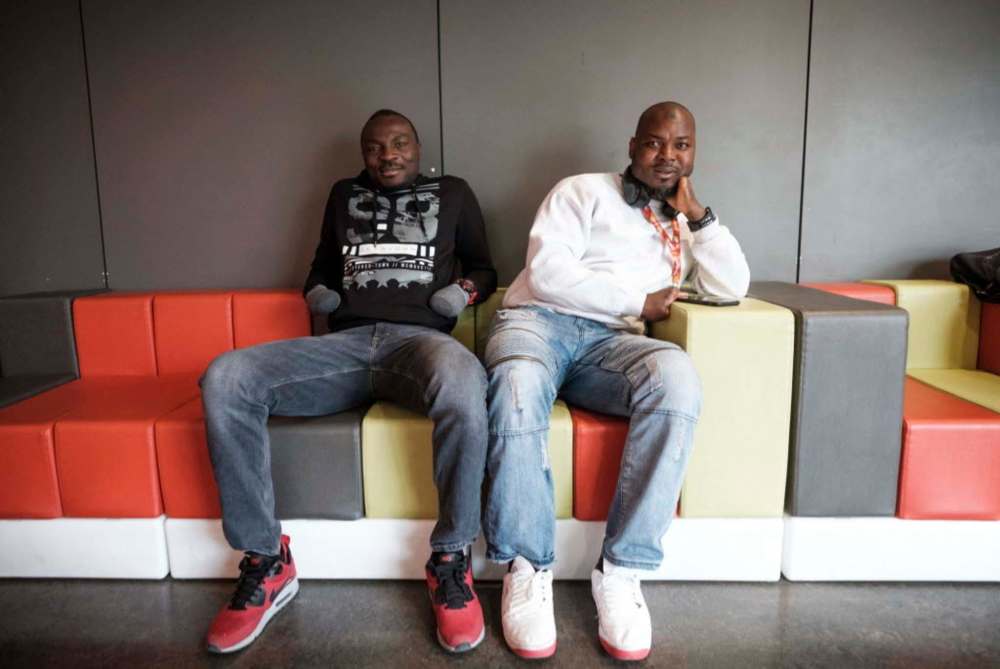
“Andraea and I had been conversing about a year ago and she was working on (Boundary Avenue) and we were working on (New Beginnings),” says Sarasvàti artistic director Hope McIntyre. “And it just didn’t make sense in a city like Winnipeg to have shows thematically related playing against each other.
“So this became a wonderful way to support each other.”
Addressing the issue gave Sarasvàti an opportunity to expand on last year’s Mental Health Project, which engaged in community consultation on the subject of mental health.
“When we did our Mental Health Project, we did a workshop with newcomer males and we talked about the mental health challenges of being a newcomer, and that kind of inspired this idea,” McIntyre says. “It kind of grew from there and when we started working on it, everything started happening — the Emerson border, and how we cope with the large number of Syrian refugees that are coming into Canada — so it’s just so important.”
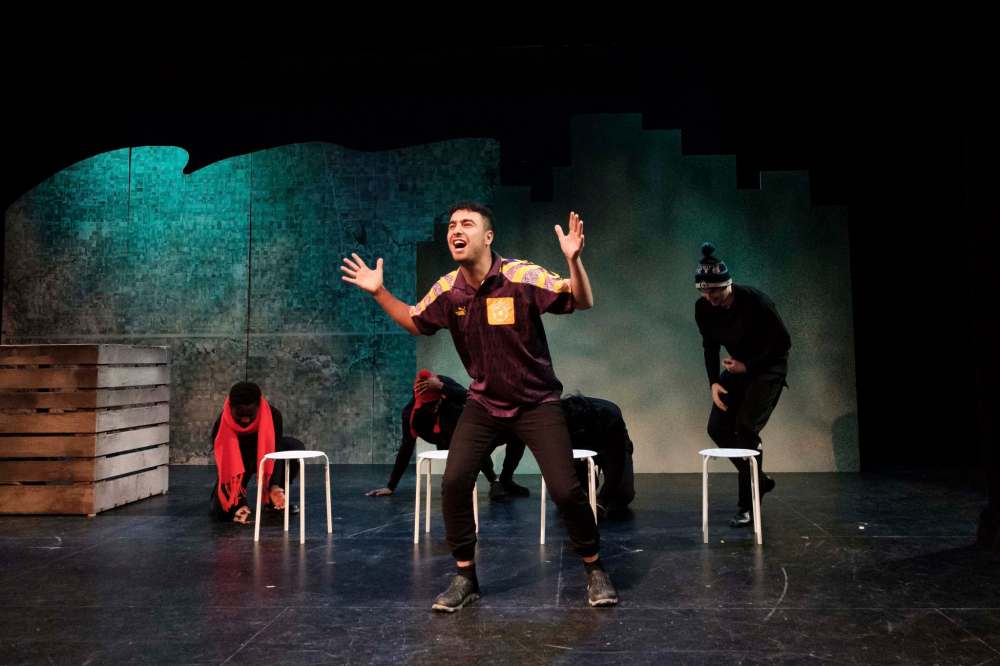
One Trunk Theatre’s artistic director Andraea Sartison got a first-hand look at the situation in the border-town of Emerson, where many refugees have made the dangerous crossing into Canada from the U.S. The experience jump-started the creation of Boundary Avenue.
Prosthetics offer helping hands to refugees who froze fingers

Eating was a tough task for the two Ghanaian men who lost their fingers to frostbite in a much-publicized crossing into Canada at Emerson in December, 2016.
They would strap a spoon onto their wrist with a Velcro contraption, but they could only use one utensil at a time.

Eating was a tough task for the two Ghanaian men who lost their fingers to frostbite in a much-publicized crossing into Canada at Emerson in December, 2016.
They would strap a spoon onto their wrist with a Velcro contraption, but they could only use one utensil at a time.
That promises to be one major change now that the men have received prosthetic fingers. Razak Iyal, 34, received his last Friday and Seidu Mohammed, 25, on Tuesday.
The mechanical devices are known as M-Fingers and include dexterous fingers controlled by movements of the wrist, a process the men said is not as complicated as it sounds.
“We are very excited and happy. It’s going to help us overcome some challenges we face and will make a huge impact in our lives,” Mohammed said.
Iyal has already learned how to pick up a utensil, a cup, open drawers and the fridge.
“It’s changing my life totally because we’ve been struggling to do things. The easiest thing to do is look for someone to help you,” Iyal said.
There will be much occupational therapy ahead, however. One of the huge challenges to not having fingers is when you drop something, say a coin or a card while getting on a bus, you can’t pick it up. That will come with time by using the new fingers.
“You have to work on it,” Iyal said. He can lift up objects weighing up to seven pounds, he’s been told.
“It’s like a glove,” he said. “The doctor told me to use it like a tool” that he puts on or takes off as needed.
The two men crossed into Canada from the United States seeking asylum on Christmas Eve. They suffered severe frostbite crossing the border in frigid conditions. Both have been granted refugee status.
Without their fingers, it has been a task just to dress themselves without help. The M-Fingers will help make them be more independent in that regard but probably not completely.
Iyal has an advantage in that he still has his own thumb. That has made a tremendous difference. Iyal has been able to live on his own but Mohammed does not.
For Mohammed, just to take a drink was difficult. He had to put his lips around a glass, grab it with his teeth, and then raise and tilt back his head.
The men had been using phones and computer keyboards by attaching a type of pen to their wrists. It will take effort to master tasks using fine motor skills with their prosthetic hands.
“We hope to work. We are tired of being at home because of our situation,” Iyal said. The Society for Manitobans with Disabilities has been trying to find them jobs, and the M-Fingers will make them more employable.
The men are extraordinarily grateful to Manitoba Health, which footed the bill for the prosthetic fingers, costing $8,000 to $10,000 per hand.
“They are both quite overwhelmed with joy,” said Frank Indome, vice-president of the Ghanaian Union of Manitoba.
Many good Samaritans dropped by their hospital beds when the situation of the Ghana asylum seekers losing their fingers was first publicized, including doctors, and helped them through the process of applying for prosthetics, Indome said.
“We want to take this opportunity to thank Manitoba Health,” Iyal said. “We also thank the people of Manitoba and of Winnipeg. They have supported us from the day we got here. We have a lot of good people around us.”
Peter ten Krooden, a prosthetist at Anderson Orthopedics, fitted the men with their prosthetic devices.
bill.redekop@freepress.mb.ca
“There’s three writers on this play — Liam Zarrillo, who’s in the play, Caroline Wintoniw, a photojournalist and myself,” Sartison says. “And while we were workshopping and writing, Caroline got called down by Vice News to go do photos at the border. I was staying with her that weekend in February last year and she asked: ‘Do you want to come?’
“So I went down to the border with her and I was shocked about the process of how people were capturing stories about who was down there and we were just blown away at the media, the townspeople and the people who were coming across,” she recalls. “It was kind of disturbing but also inspiring, and we knew this was the story we wanted to tell.
“Boundary Avenue tells the story of a career-hungry journalist in Winnipeg who’s trying to make or break his career by going down to the border and getting this story no matter what,” she says.
The second part of the story is told from the refugee’s perspective. “Hamza” is an amalgamation of both Razak Iyal and Seidu Mohammed, who both came to Canada to escape a deadly fate in Ghana, albeit for different reasons. In the play, “Hamza” is endangered for the same reason as Mohammed.
“Seidu was trying out for a Brazilian soccer team and was found to be with another man, which is not legal in Ghana and his life was threatened and he couldn’t go back home once word got out, so he fled from Brazil,” Sartison explains, adding that the two men became contributors in the process.
“We presented the script to them and they gave us edits, like ‘We don’t talk like that,’ or ‘That’s not what we said,’” Sartison says, adding the men attended rehearsals so they really are core collaborators now.
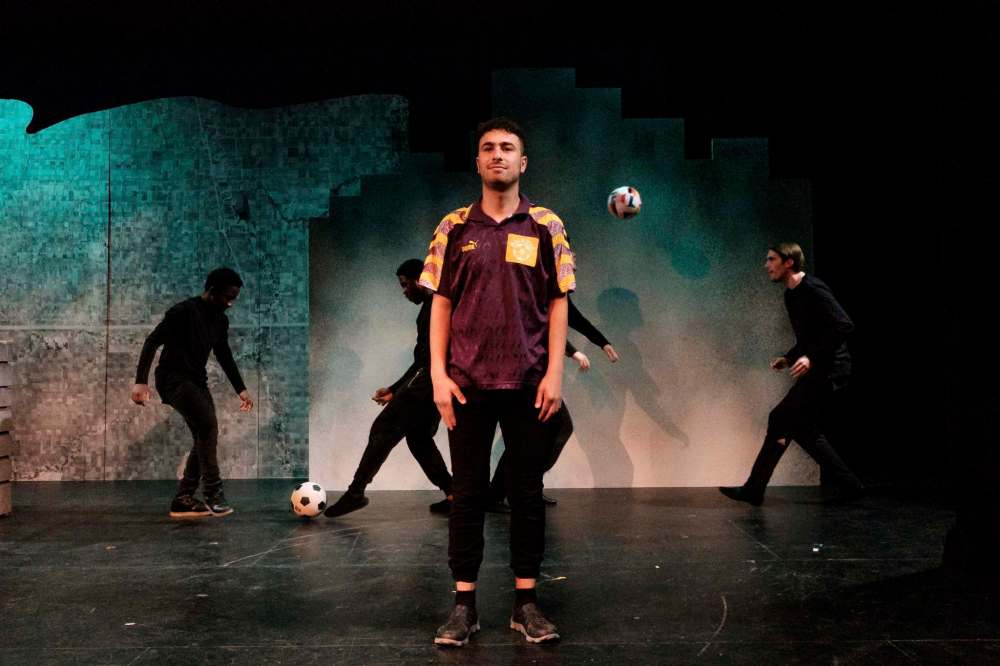
As a fundraising element, five dollars from every ticket sold goes directly to Razak and Seidu.
New Beginnings’ contributors number in the hundreds, McIntyre says, including musical contributions made by local musician Gerry Atwell and local choreographer Brenda Gorlick.
“We selected 12 stories in the play, but there’s also two musical numbers that are compilations of multiple people,” McIntyre says. “We had about 100 people be interviewed or participate in workshops.
“And we took all these quotes and Gerry Atwell, our musical director, used the quotes to create the lyrics, so although there’s 12 core stories in the piece, there’s also representation from dozens more.”
randall.king@freepress.mb.ca
Twitter: @FreepKing

In a way, Randall King was born into the entertainment beat.
Our newsroom depends on a growing audience of readers to power our journalism. If you are not a paid reader, please consider becoming a subscriber.
Our newsroom depends on its audience of readers to power our journalism. Thank you for your support.
History
Updated on Wednesday, May 23, 2018 3:25 PM CDT: Adds headline

